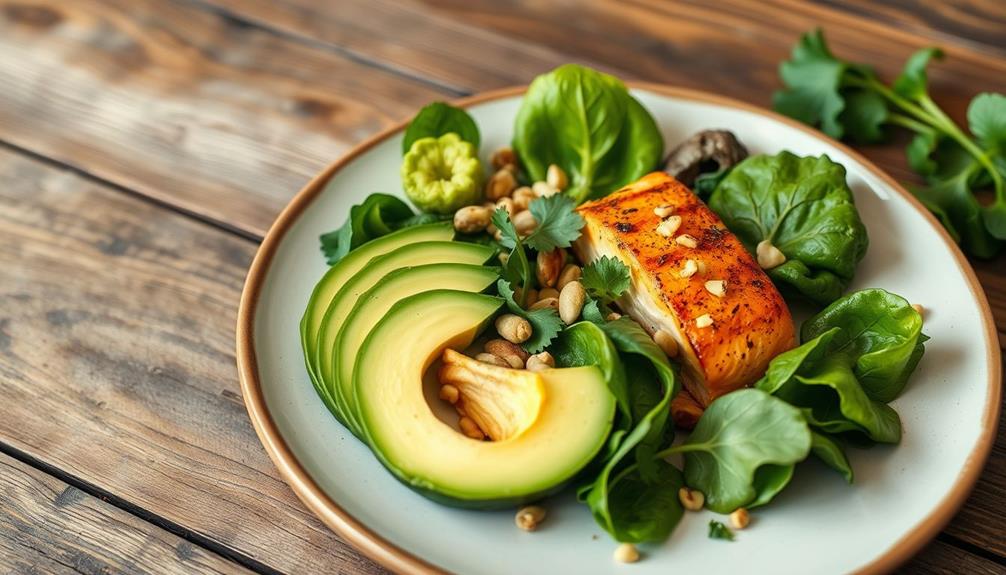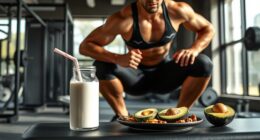The keto diet can affect your cholesterol levels in several ways. Generally, it tends to raise LDL cholesterol, sometimes considerably, while also increasing HDL cholesterol, which is beneficial. If you're consuming unhealthy fats, especially saturated fats from red meats, you might see a larger increase in LDL. However, using healthy fats like olive oil and avocados can help manage these levels better. It's crucial to monitor your cholesterol regularly, especially if you have existing health concerns. Understanding how these factors interact can help you navigate your keto journey more effectively. There's more to explore on this topic.
Key Takeaways
- The keto diet often raises LDL cholesterol levels significantly, with an average increase of 245% after one year.
- Unsaturated fats, like those from avocados and nuts, can help mitigate LDL increases on a keto diet.
- The diet typically increases HDL cholesterol levels, which is beneficial for heart health.
- Individual responses to the keto diet vary; genetic factors and starting triglyceride levels influence cholesterol changes.
- Careful monitoring of cholesterol levels is vital for anyone on the keto diet, especially those with pre-existing conditions.
Overview of the Keto Diet
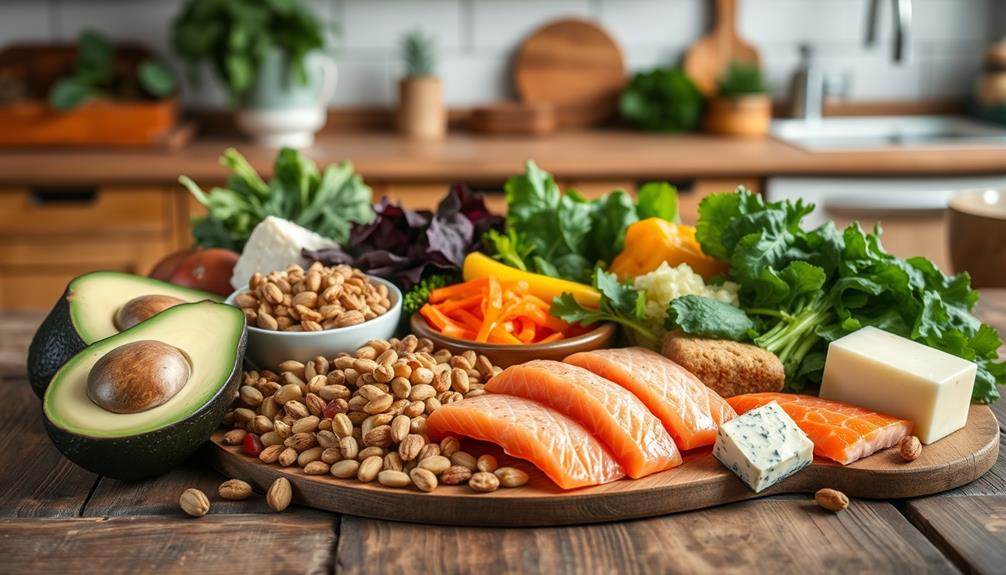
The ketogenic diet, often referred to as keto, is a high-fat, low-carbohydrate eating plan that shifts your body into a state called ketosis. In this metabolic state, your body burns fat for energy instead of carbohydrates, which can lead to significant weight loss. To achieve ketosis, you typically need to limit your carbohydrate intake to 20-50 grams per day, allowing fats to make up about 75% of your caloric intake, while protein constitutes around 20%.
Incorporating effective strategies for weight loss can enhance your experience on the keto diet by promoting sustainable results and overall health.
Originally developed for treating epilepsy in children, the ketogenic diet has gained traction among adults for its potential benefits in weight management and blood sugar control, particularly for those with type 2 diabetes.
However, while many people report short-term success, the long-term effects of a high-fat diet remain largely unknown, raising concerns about possible health risks.
When following the ketogenic diet, it's essential to focus on quality fats. Opting for monounsaturated and polyunsaturated fats over processed or saturated fats may help mitigate some health risks associated with elevated cholesterol levels.
Cholesterol Changes on Keto

When you start a ketogenic diet, you might notice significant changes in your LDL cholesterol levels.
These changes can be influenced by the types of dietary fats you consume, especially if you're eating a lot of red meat.
It's important to reflect on how investment regulations in your dietary choices can affect your health outcomes.
Additionally, it's crucial to monitor these fluctuations to understand their impact on your overall health.
LDL Cholesterol Variability
Experiencing fluctuations in LDL cholesterol levels is common for those on a ketogenic diet, often leading to significant changes over time. When you start a ketogenic diet, you might see an average increase in LDL cholesterol levels, sometimes up to 187 mg/dL. However, once you stop the diet, there's potential for a dramatic decrease of around 174 mg/dL. This cholesterol variability can be influenced by several factors, including your choice of fats.
| Factor | Impact on LDL Levels | Recommendation |
|---|---|---|
| Unsaturated Fats | May lower LDL cholesterol levels | Incorporate more unsaturated fats |
| Saturated Fats | Can increase LDL cholesterol levels | Limit saturated fat intake |
| Pre-existing Conditions | Higher LDL response in some cases | Monitor cholesterol regularly |
If you have high triglyceride levels or genetic predispositions, you might experience exaggerated increases in LDL. The American Heart Association warns that high cholesterol levels can raise your cardiovascular risk. So, while the ketogenic diet has its benefits, keeping an eye on your cholesterol variability is essential for your health.
Impact of Dietary Fats
Understanding how dietary fats impact cholesterol changes on a ketogenic diet is vital for managing your health. On a keto diet, you'll consume high levels of dietary fats, which can affect your cholesterol levels differently depending on the types of fats you choose. Saturated fats, often found in red meats, may lead to increased LDL cholesterol, the so-called "bad" cholesterol.
However, incorporating more unsaturated fats—like those from avocados, nuts, and olive oil—can help mitigate this effect and support healthier lipid profiles. Additionally, just as diversifying investments can protect against economic volatility, diversifying your sources of dietary fats can contribute to a balanced lipid profile and overall health.
Tax advantages available when managing your dietary choices may also play a role in your long-term health strategy.
Research indicates that while your LDL cholesterol may show modest increases or changes, your HDL cholesterol, or "good" cholesterol, often increases on a ketogenic diet. This variation largely depends on your starting cholesterol levels and the composition of your diet.
If you have pre-existing high cholesterol or genetic factors like familial hypercholesterolemia, you might experience more pronounced changes, making it essential to monitor your lipid profiles regularly.
Ultimately, understanding the impact of dietary fats allows you to craft a personalized approach to your ketogenic diet and maintain balanced cholesterol levels.
Impact of Keto on LDL Levels

The ketogenic diet considerably impacts LDL cholesterol levels, often leading to notable increases in just a year. Research indicates that individuals on this diet experience an average increase of 187 mg/dL in LDL cholesterol, which is a staggering 245% increase after about 12 months.
This significant change can alter your lipid profiles and may raise your cardiovascular risk, especially if you have preexisting conditions. It's essential to recognize that the importance of selecting the right cold medication can also relate to managing overall health, including cholesterol levels.
It's vital to reflect on the types of fats you consume while on the ketogenic diet. Diets rich in unsaturated fats tend to result in lower increases in LDL levels compared to those high in saturated fats. If you have genetic factors, like familial hypercholesterolemia, you might see even more pronounced increases in LDL cholesterol.
Regular monitoring of your cholesterol levels is essential while following a ketogenic diet. This is particularly significant for individuals with existing high cholesterol or other cardiovascular risk factors.
HDL Levels and Keto Diet
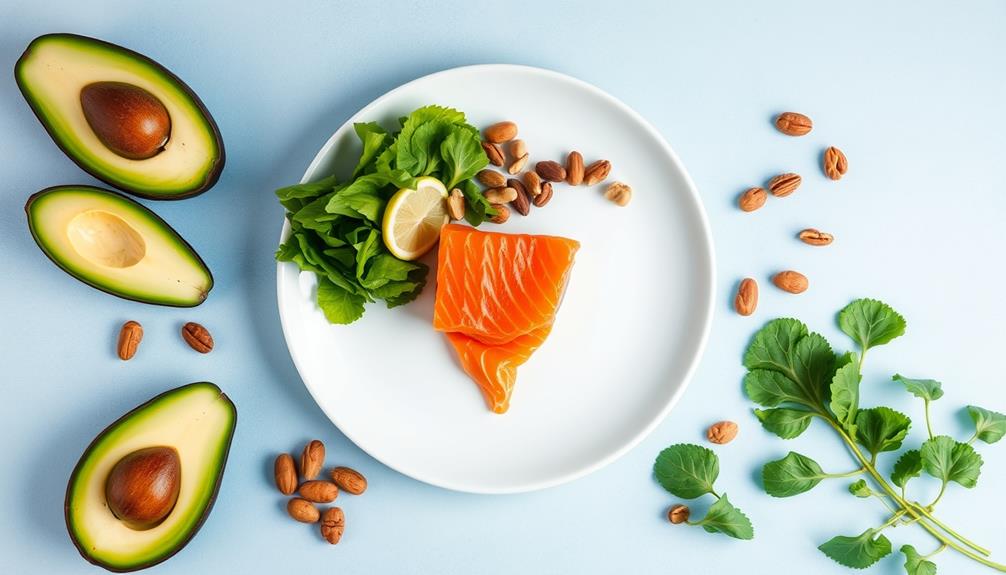
On a ketogenic diet, you might notice an increase in your HDL cholesterol levels, which is often referred to as the "good" cholesterol.
This rise can be beneficial for your heart health, as higher HDL levels are linked to a reduced risk of heart disease.
Additionally, the high-fat nature of the keto diet may provide antioxidant benefits, similar to those found in cranberry juice consumption.
It's important to monitor these changes, as they can indicate positive shifts in your overall lipid profile.
HDL Cholesterol Increase
A notable benefit of the ketogenic diet is its ability to greatly boost HDL cholesterol levels, often referred to as "good cholesterol." Many studies show that after just a few weeks on this low-carb, high-fat regimen, participants typically experience marked increases in their HDL levels. This increase is primarily due to the higher intake of healthy fats, such as monounsaturated and polyunsaturated fats, which are vital for promoting cardiovascular health.
Additionally, incorporating essential oils like eucalyptus oil may enhance overall wellness and support respiratory health, complementing the benefits of a ketogenic lifestyle.
Research indicates that the effects of the ketogenic diet on HDL cholesterol can lead to a better lipid profile. In fact, participants with higher baseline HDL levels before starting the diet often see more significant improvements during the dietary intervention. This enhancement in HDL cholesterol is linked to overall heart health, as it plays a significant role in transporting cholesterol away from the arteries and back to the liver.
As you consider adopting the ketogenic diet, keep in mind that an increase in HDL cholesterol can be a positive outcome. By focusing on healthy fats and reducing carbs, you can potentially boost your cardiovascular health and improve your lipid profile, setting the stage for lasting benefits.
Impact on Heart Health
Boosting your heart health can be a significant benefit of the ketogenic diet, especially through its impact on HDL cholesterol levels. Research shows that following a keto diet can lead to an increase in HDL (good cholesterol) levels, which is tied to a reduced risk of heart disease. Participants often see an average HDL increase of about 10-15% over several months.
This boost in HDL cholesterol levels is primarily due to the diet's emphasis on healthy fats, particularly monounsaturated and polyunsaturated fats. Additionally, many investors are turning to precious metal IRAs as a secure way to protect their wealth, similar to how individuals protect their heart health through dietary choices.
While some may initially experience a rise in LDL (bad cholesterol) when starting the ketogenic diet, the overall effect on heart health can still be positive. Elevated HDL levels can counteract some of the risks associated with higher LDL levels, promoting cardiovascular health.
It's essential to monitor your cholesterol levels regularly, as the effects on the body can vary based on your individual dietary choices and genetics. By focusing on quality fats, you can enhance your cholesterol levels and support your heart health effectively while following the ketogenic diet.
Factors Influencing Cholesterol Changes

Several factors influence how cholesterol levels change when following a ketogenic diet. One major consideration is the effects of the ketogenic diet on LDL cholesterol, which may rise considerably for some individuals—up to 187 mg/dL after a year.
Your genetic factors also play an essential role; for instance, if you have mutations like familial hypercholesterolemia, you might see more pronounced increases in LDL cholesterol. Understanding the importance of financial considerations for elderly care can also be beneficial for those managing health costs while making dietary changes.
The quality of fats you consume is vital, too. Diets rich in unsaturated fats tend to lower LDL cholesterol levels compared to those high in saturated fats.
Additionally, your starting triglyceride levels can predict your cholesterol responses. If your triglycerides are normal (<150 mg/dL), you may face safer outcomes on a keto diet compared to elevated levels.
Lastly, monitoring your overall dietary structure and making personalized adjustments can considerably influence cholesterol outcomes. Increasing fiber intake and opting for heart-healthy fat sources can help balance your cholesterol levels.
Health Risks of the Keto Diet

While understanding the factors influencing cholesterol changes is important, recognizing the health risks associated with the ketogenic diet is equally essential.
Keto diets can lead to a significant increase in LDL levels, with studies showing a staggering 245% rise after just over a year. This spike raises concerns about long-term heart disease and other cardiovascular diseases. Individuals with Borderline Personality Disorder (BPD) may also experience heightened emotional dysregulation, which can complicate dietary changes and adherence.
It's vital to evaluate the following health risks:
- High saturated fat intake may contribute to atherosclerosis.
- Individuals with pre-existing high cholesterol could see worsened lipid levels.
- Limited long-term studies leave questions about the diet's overall impact on heart health.
For those with certain health conditions, such as kidney disease or familial hypercholesterolemia, the keto diet can place additional stress on lipid metabolism, potentially leading to severe complications.
If you're contemplating this diet, especially with pre-existing high cholesterol, careful monitoring is key. Be aware of how your body responds, and consult a healthcare professional for personalized advice.
The potential risk to your weight and cholesterol levels shouldn't be taken lightly, as the consequences could affect your cardiovascular health in the long run.
Dietary Considerations for Cholesterol
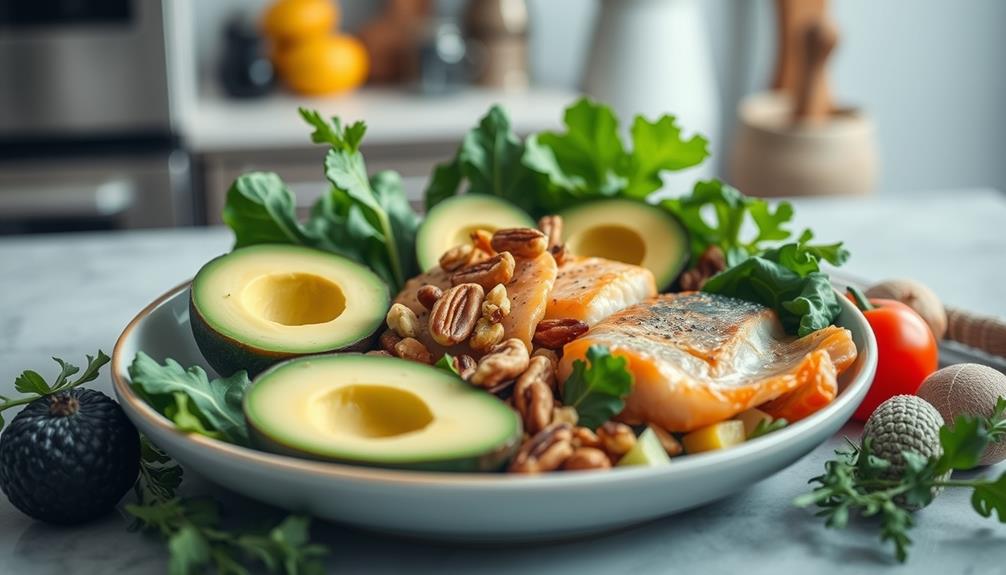
Managing cholesterol on a ketogenic diet requires a thoughtful approach to food choices. It's important to be aware of how dietary fats can influence cholesterol levels, as certain types of fats may have differing effects on heart health.
To maintain healthy cholesterol levels, focus on incorporating healthy fats, such as monounsaturated and polyunsaturated fats, which can help lower LDL cholesterol over time. Additionally, understanding mammography guidelines can be beneficial for overall health awareness. Aim to include fiber-rich foods like nuts, seeds, and low-carb vegetables in your meals, as these can support cholesterol management and enhance heart health.
Be cautious about high meat consumption, especially red meats, as they may boost lipid levels. Opt for lean proteins and prioritize plant-based fats to keep your LDL cholesterol in check.
Regular monitoring of cholesterol levels is vital, particularly if you have preexisting high cholesterol or other heart disease risk factors.
It's essential to consult with healthcare professionals to tailor your dietary plan. They can help you guarantee a balanced intake of essential nutrients while effectively managing your cholesterol on a ketogenic diet.
Monitoring Cholesterol on Keto
As you commence on a ketogenic diet, keeping a close eye on your cholesterol levels becomes vital for maintaining heart health. Monitoring is particularly important since studies indicate that LDL cholesterol may initially rise before potentially decreasing after you stop the diet.
Regular lipid checks are important, especially if you have preexisting high cholesterol or triglyceride levels exceeding 1,000 mg/dL.
Consider these key points:
- Individuals with normal triglyceride levels (<150 mg/dL) can typically try the keto diet safely.
- Elevated triglyceride levels may increase the risk of worsened cholesterol responses, so caution is advised.
- The quality of fats you consume—favoring unsaturated fats—can greatly influence your cholesterol outcomes.
Also, keep in mind that genetic factors like familial hypercholesterolemia can affect how your body responds to the ketogenic diet.
As a result, it's wise to consult with healthcare providers for personalized monitoring. Overall, staying informed about your cholesterol levels and making thoughtful dietary choices helps guarantee that your keto journey supports your heart health rather than jeopardizing it.
Recommendations for Heart Health

Prioritizing heart health on a ketogenic diet involves making mindful choices about the fats you consume. Focus on incorporating monounsaturated fats, like avocados and olive oil, and polyunsaturated fats from sources such as fatty fish and flax seeds. These fats can help improve your cholesterol levels while minimizing saturated fats, which may negatively impact heart health.
In addition to healthy fats, it's essential to include high-fiber foods in your diet. Low-carb vegetables, nuts, and seeds not only support overall cardiovascular health but also help manage cholesterol levels.
Regularly monitoring your lipid profile is vital, especially for tracking LDL and HDL cholesterol levels. This is particularly important if you have preexisting high cholesterol conditions.
Don't forget to consult with healthcare professionals for personalized dietary plans, especially if you have genetic predispositions, like familial hypercholesterolemia.
Frequently Asked Questions
Should You Do Keto if You Have High Cholesterol?
If you've got high cholesterol, you should approach the keto diet cautiously. It might raise your LDL levels considerably. Consult your healthcare provider and monitor your lipid levels regularly before making any dietary changes.
How Long Does It Take to Lower Cholesterol on Keto?
When you start the keto diet, you might notice changes in your cholesterol levels within weeks. Long-term adherence typically shows significant improvements after 12 to 24 months, depending on your individual response and dietary choices.
What Is the Best Diet to Lower Cholesterol?
Think of your diet as a garden; you've gotta nurture it with fruits, vegetables, whole grains, and healthy fats. Limiting processed foods and adding fiber-rich options helps you lower cholesterol and boost heart health effectively.
Will a Low-Carb Diet Lower Cholesterol?
A low-carb diet can impact cholesterol levels differently for everyone. You might see improvements in HDL and triglycerides, but LDL could increase, especially with high saturated fat intake. Monitor your cholesterol closely to understand your response.
Conclusion
In the grand tapestry of diets, the keto diet weaves a complex pattern with cholesterol. While it can boost your HDL, the impact on LDL varies, much like the tides of the ocean. Keep an eye on your numbers, just as Odysseus navigated his journey home. By staying mindful of your choices and consulting healthcare professionals, you can steer clear of potential pitfalls and set out on a path toward heart health, making your dietary adventure both enjoyable and safe.





